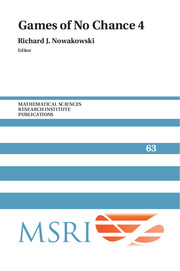Book contents
- Frontmatter
- Contents
- Preface
- Peeking at partizan misère quotients
- A survey about Solitaire Clobber
- Monte-Carlo approximation of temperature
- Retrograde analysis of Woodpush
- Narrow misère Dots-and-Boxes
- Toppling conjectures
- Harnessing the unwieldy MEX function
- The Rat Game and the Mouse Game
- A ruler regularity in hexadecimal games
- A handicap strategy for Hex
- Restrictions of m-Wythoff Nim and p-complementary Beatty sequences
- Computer analysis of Sprouts with nimbers
- Navigating the MAZE
- Evaluating territories of Go positions with capturing races
- Artificial intelligence for Bidding Hex
- Nimbers in partizan games
- Misère canonical forms of partizan games
- The structure and classification of misère quotients
- An algorithm for computing indistinguishability quotients in misére impartial combinatorial games
- Unsolved problems in combinatorial games
- Combinatorial games: selected short bibliography with a succinct gourmet introduction
A ruler regularity in hexadecimal games
Published online by Cambridge University Press: 30 May 2025
- Frontmatter
- Contents
- Preface
- Peeking at partizan misère quotients
- A survey about Solitaire Clobber
- Monte-Carlo approximation of temperature
- Retrograde analysis of Woodpush
- Narrow misère Dots-and-Boxes
- Toppling conjectures
- Harnessing the unwieldy MEX function
- The Rat Game and the Mouse Game
- A ruler regularity in hexadecimal games
- A handicap strategy for Hex
- Restrictions of m-Wythoff Nim and p-complementary Beatty sequences
- Computer analysis of Sprouts with nimbers
- Navigating the MAZE
- Evaluating territories of Go positions with capturing races
- Artificial intelligence for Bidding Hex
- Nimbers in partizan games
- Misère canonical forms of partizan games
- The structure and classification of misère quotients
- An algorithm for computing indistinguishability quotients in misére impartial combinatorial games
- Unsolved problems in combinatorial games
- Combinatorial games: selected short bibliography with a succinct gourmet introduction
Summary
An important problem in the theory of impartial games is to determine the regularities of their nim-sequences. Subtraction games have periodic nim-sequences and those of octal games are conjectured to be periodic, but the possible regularities of the nim-sequence of a hexadecimal game are unknown. Periodic and arithmetic periodic nim-sequences have been discovered but other patterns also exist. We present an infinite set of hexadecimal games, based on the game 0.2048, that exhibit a regularity—ruler regularity—not yet reported or codified.
A taking-and-breaking game [Albert et al. 2007; Berlekamp et al. 2001] is an impartial combinatorial game, played with heaps of beans on a table. A move for either player consists of choosing a heap, removing a certain number of beans from the heap, and then possibly splitting the remainder into several heaps; the winner is the player making the last move. For example, both Grundy’s Game (choose a heap and split it into two unequal heaps) and Couples-Are-Forever (choose a heap with at least three beans and split it into two) are taking-and-breaking games with very simple rules, however neither has been solved.
We present an overview of the required theory of impartial games. The reader can consult the references above for a more in-depth grounding in the theory of, and for more details about, subtraction and octal games.
Information
- Type
- Chapter
- Information
- Games of No Chance 4 , pp. 115 - 128Publisher: Cambridge University PressPrint publication year: 2015
